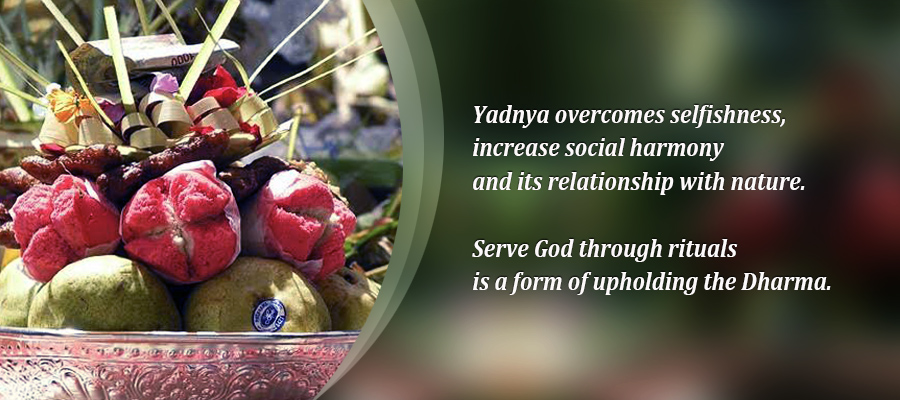Hindu rituals are synonymous with the practice of Hinduism and constitute an important part of Hindu Dharma or the Hindu way of life. You cannot truly practice Hinduism, without practicing some of the rituals. Rituals such as the Samskaras are so deeply interwoven into human life, that it is difficult to separate them and set them aside as mere religious practices.
For example, traditional Hindu weddings are incomplete without the accompanying wedding rituals. The bride has to be gifted by the gods through the mediation of a priest. The gods also serve as the subtle witnesses along with family members to the marriage ritual so that both the partners in the marriage are bound by a divine covenant and cannot dilute their marriage obligations.
So is the case with the rituals associated with birth, initiation, etc. Hence, at least the important Hindu rituals cannot be ignored as frivolous or superficial. The rituals also provide the gods with an opportunity to serve as witnesses to the human activities upon the earth, so that humans cannot easily abandon their Dharma or their duties and moral obligations, without attracting the wrath or the displeasure of the gods.
However, being a very ancient religion, with a history of over 5000 years, Hinduism contains many rituals for different purposes and occasions. This plethora of rituals can be very confusing to a novice who may not possess adequate knowledge of Hinduism. Many of them are so outdated that they do not make any sense in today’s world. Hence, discretion is required so that one does not succumb to superstition and blind faith, or become distracted from the more important goal of liberation. Unfortunately, we have many charlatans and imposters in our society who try to take advantage of people by appealing to their fears and promise to solve their problems with the help of frivolous and even made up rituals.
The rituals of Hinduism are especially important for the Householders to achieve the three important aims of human life, namely Dharma, Artha, and Kama. They are not that important for the pursuit of liberation (Moksha), except as the means to accumulate good karma and obtain a good birth, or to prepare oneself for the austere life of a renunciant. The Upanishads caution people not to become overly preoccupied with rituals since they do not really contribute to spiritual progress or the transformation of the mind and body. They may even increasingly draw the people into worldly life by satisfying their desires and thereby delay their liberation.
Despite these limitations, it is difficult to envisage Hinduism without its rituals or practice it. They constitute the applied aspects of Hinduism and more specifically of the Vedas. Since they are part of the obligatory duties of humans upon the earth, they are the means to the sacred karma as well as the Dharma (obligatory duties) of devout Hindus. Our knowledge of Hindu rituals comes to us mostly from the Vedas and the Tantras, whose source is God himself. Therefore, they represent Brahman or Isvara in his manifested state as the efficient and material cause of creation.
When properly performed according to the scriptural injunctions, Hindu rituals can unleash great powers and help humans to fulfill their desires and achieve their goals. From the Vedic perspective, they serve as a bridge between our world and the world of gods and that of ancestors. With their help, humans can not only communicate with them but also ascend to those worlds after death. Chants (Riks), songs (Samans), prayers, sacred formulae (Yajus), sacred speech and mystic words are central to the practice of Hindu rituals. Mantras (sacred syllables) and Tantras (mystic syllables and diagrams) ensure their magical quality, while their efficacy is ensured by the purity of thought, speech, intention, and action. In other words, physical and mental purity are vital to the observance of Hindu rituals.
The Rigveda suggests that Brahman himself was the source of the ritual model. He performed a great sacrifice at the beginning of creation to manifest the worlds and beings out of himself. That model was revealed by Brahma to gods and humans. Just as God and the Trinity, they have the power to create, preserve and destroy the diverse aspects of creation. Since they are considered vital to creation and existence, the Purva Mimansa school considers rituals the source of everything.
Hindu religious practices are meant to be practiced for the welfare of the world and to uphold Dharma. In Hinduism, selfishness is considered evil. Therefore, it should be avoided even while pursuing one’s desires through the rituals and sacrifices. The essential purpose of Hindu rituals is to engage in dutiful karma rather than selfish karma as a service to God rather than to oneself. One may use them to harness the power of God for one’s own happiness (without harming others), for the welfare of the world and its order and regularity. As we see later, the destructive power of rituals should be used only when it becomes necessary to protect Dharma.
Why rituals are important
Hindus practice religious rituals or sacrificial ceremonies for various reasons. The following are a few important reasons why rituals are considered important in Hindu religious practice.
1. To overcome selfishness
By nature, humans are selfish and desire-ridden. They are inclined to think of themselves, their families, their problems and their own welfare. The same attitude may prevail in religious practice also. Hindu rituals are designed in such a way that they promote giving and discourage selfishness. The sacrificial rituals provide the worshippers with an opportunity to transcend their selfishness and attachment to worldly possessions and engage in charitable and philanthropic activities. As stated before, they facilitate giving of gifts by the hosts of sacrifices to the priests, holy men, and the participating guests. On that occasion, one may gift land, food, money, cattle, gold, clothes or anything they deem fit. Hence, karmically sacrifices are deemed good actions (Punya karma), which facilitate the distribution of wealth and which leads to positive consequences for those who engage in them and those who participate in them.
2. To serve God and uphold Dharma
Because of the emphasis given to them in the life of an individual, Hindu rituals remind people of their religious duties upon the earth and their commitment to Dharma. The rituals are not mere mechanical observances, but actions which facilitate order and regularity, peace and happiness. As God’s personal representatives upon the earth and for the sake of their own spiritual and material Wellbeing, humans cannot ignore them. Further, they form part of their obligatory duties and way of life. The scriptures affirm that Dharma is the protector. God protects and upholds the world through Dharma only. It is by protecting the Dharma that one can hope to protect oneself and others. The best way to do it is by practicing the prescribed rituals according to the scriptural injunctions and observing the code of conduct. If they neglect them, Dharma will decline and evil will ascend, which will increase their suffering and chances of spiritual downfall.
As emphasized elsewhere, Hindu rituals promote social responsibility and cooperation among diverse sections of society. Most Hindu sacrificial ceremonies and rituals require a collective effort, including the daily sacrifices. They are also primarily meant to be performed for others and their welfare, not for oneself. Since people need to interact with others and seek their help to perform their sacrificial duties, the rituals undoubtedly promote positive social interaction, group effort, and social harmony. Being meritorious actions (Punya Karma), they also collectively contribute to the order and regularity of the world, peace and social good. They also strengthen family bonds and relationships, as the members of the family participate in them along with the host and experience feelings of belongingness. One of the purposes of the caste system is to create a division of labor and thereby promote social and economic interdependence among people in the practice of Dharma. Sacrificial ceremonies bring that ideal to the forefront.
Need for balance and restraint
Although rituals have a place in Hinduism, the tradition does not encourage their excessive use or overindulgence. The Sacrificial ceremonies and ritual worship are a means for the householders to perform their duties and meet their obligations, but they are not in end themselves. This is an important lesson one learns from the Upanishads, which frequently reminds people that their aim should be to attain liberation, not excessively engage in rituals to satisfy their selfish desires.
According to the Upanishads, ritual knowledge (Karma-Kanda) is inferior and constitute ignorance (Avidya), since they lead to rebirth, but not liberation. They may temporarily help people to fulfill their desires or overcome their problems by propitiating the gods, but do not permanently resolve their suffering or their bondage to the cycle of births and deaths. Liberation is possible only when they control their desires and abide in the Self. Therefore, one should strive to attain liberation, rather than seeking worldly pleasures and comforts through the sacrifices. For that, one must pursue the higher knowledge (vidya) of the Self, or the knowledge which leads to self-realization and liberation. By knowing the Self through internal rituals, one becomes eternally free.
Thus, the true sacrifice is the internal sacrifice, in which one engages the mind and body and makes one’s life an offering to God. Hindu law books unequivocally declare that mental sacrificial rituals are superior to their physical counterparts and the one, in which the Self becomes the offering, the offerer and the object of the offering, is the highest.
It is also important not to become a victim of superstition and Tamasic delusion and blindly rely upon rituals to gain temporary benefits at the cost of one’s spiritual welfare.





